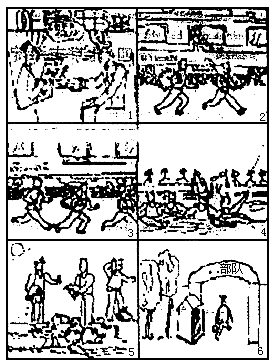
题目列表(包括答案和解析)
书面表达
解放军某部队战士王刚在回家探亲的火车上从报纸上得知长江沿岸地区遭遇洪水侵袭的消息,便毫不犹豫地加入到当地抗洪抢险的队伍中去,并提前返回部队。请根据下列画面为China Daily写一篇报道。
要求:1)报道须包括图画所有内容,可适当增减细节;
2)词数:120左右;
3)参考词汇;部队unit洪水flood
4)开头已为你写好,不计入字数。

One day, Wang Gang, who was a PLA man, was on the train back home.
________________________________________________________
________________________________________________________
________________________________________________________
第二节:短文改错(共10小题,每题1分,满分10分)
此题要求改正所给短文中的错误。对标有题号的每一行做出判断:
每行只有一个错误,请按下列情况改正:
该行多一个词:把多余的词用斜线(\)划掉,在该行右边横线上写出该词,并也用斜线划掉。
该行缺一个词:在缺词处加一个漏字符号(∧),在该行右边横线上写出该加的词。
该行错一个词:在错的词下划一横线,在该行右边横线上写出改正后的词。
注意:原行没有错的不要改。
Fishing is my favorite sport. I often fished for 81________________
hour without catching anything, but this doesn’t worry 82. ________________
me. Some fishermen are unlucky, instead catching fish, 83. ________________
they catch old boots or rubbish. But I’m even less luck. I 84________________
never catch everything—even old boots after 85. ________________
spend a whole morning on the river. So I always go home 86. ________________
with empty bag. “You should give up fishing,” my friends 87. ________________
say, “It’s a waste time.” But they don’t realize one 88. ________________
important thing. I’m not real interested in fishing. I’m 89 ________________
only interested in sitting in a boat and do nothing at all. 90. ________________
此题要求改正所给短文中的错误。对标有题号的第一行作出判断:如无错误,在该行右边横线上画一个勾(√);如有错误(每行只有一个错误),则按下列情况改正:
此行多一个词:把多余的词用斜线(\)划掉,在该行右边横线上写出该词,并也用斜线划掉。
此行缺一个词:在缺词处加一个漏写符号(∧),在该行右边横线上写出该加的词。
此行错一个词:在错的词下划一横线,在该行右边横线上写出改正后的词。
注意:原行没有错的不要改。
Many year ago a poor man grew an orange tree. 76. _______
On the tree there were many fine oranges. Some day he found 77. _______
one of them was so big as a football . He took it 78. _______
to the king . The king was so happy that he gave the 79. _______
poor man lots money. When a rich man heard of it , 80. _______
he said for himself ,"I'll take my gold cup to the king 81. _______
and he will give me much money . The next day the king receive 82. _______
from the cup . The king was very fond of the cup and he told 83. _______
the rich man, “I have an orange . It is beautiful than the cup, 84. _______
so I have decided to give it to you as the reward instead money”. 85. _______
SECTION B(10分)
Directions: Read the following passage.Answer the questions according to the information given in the passage and the required words limit.Write your answers on your answer sheet.
In a time of low academic achievement by children in the United States, many Americans are turning to Japan, a country of high academic achievement, for possible answers. However, the answers provided by Japanese preschools are not the ones Americans expected to find. In most Japanese preschools, surprisingly little emphasis is put on academic instruction. In one investigation, 300 Japanese and 210 American preschool teachers, child development specialists, and parents were asked about various aspects of early childhood education. Only 2 percent of the Japanese respondents (答问卷者)listed "to give children a good start academically" as one of their top three reasons for a society to have preschools. In contrast, over half the American respondents chose this as one of their top three choices. To prepare children for success full careers in first grade and beyond, Japanese schools do not teach reading, writing, and math emetics, but rather skills such as persistence, concentration, and the ability to function as a member of a group. The vast majority of young Japanese children are taught to read at home by their parents.
In the recent comparison of Japanese and American preschool education, 91 percent of Japanese respondents chose providing children with a group experience as one of their top three reasons for a society to have preschools. Sixty-two percent of the more individually oriented (强调个性发展的) Americans listed group experience as one of their top three choices. An emphasis on the importance of the group seen in Japanese early childhood education continues into elementary school education.
Like in America, there is diversity in Japanese early childhood education. Some Japanese kindergartens have specific aims, such as early musical training or potential development. In large cities, some kindergartens are attached to universities that have elementary and secondary schools. Some Japanese parents believe that if their young children attend a university-based program, it will increase the children’s chances of eventually being admitted to top-rated schools and universities. Several more progressive programs have introduced free play as a way out for the heavy intellectualizing in some Japanese kindergartens.
81.What’s the main reason for many American parents sending their children to preschools in Japan? (no more than 11 words)
_____________________________________________________________________________
82.Who teach the Japanese preschool children to read mostly? (no more than 2 words)
_____________________________________________________________________________
83.List three qualities that Japanese preschools encourage in their kids. (no more than 13 words)
_____________________________________________________________________________
84.According to the last paragraph, what problem do some Japanese kindergartens have? (no more than 3 words)
_____________________________________________________________________________
| |||||||||||||||||||||||||||||||||||||||||||||||||||||||||||
湖北省互联网违法和不良信息举报平台 | 网上有害信息举报专区 | 电信诈骗举报专区 | 涉历史虚无主义有害信息举报专区 | 涉企侵权举报专区
违法和不良信息举报电话:027-86699610 举报邮箱:58377363@163.com